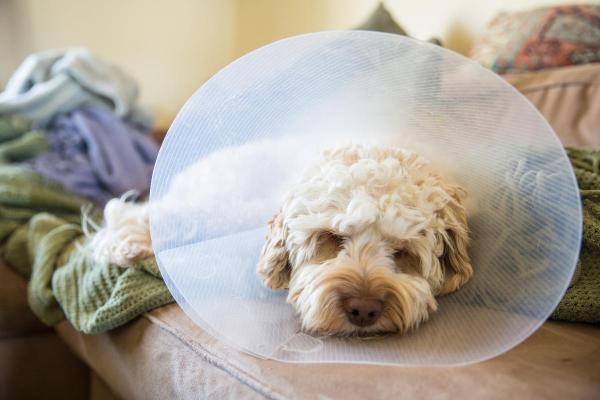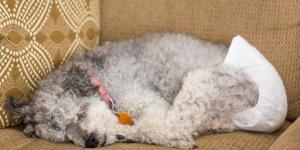My Dog Is Not Peeing After Neutering



See files for Dogs
Complications after neutering surgery are rare, but we need to be observant for any possible sign of a problem. Some symptoms are more obvious than others, such as bleeding from the incision wound. A dog not urinating after they have been neutered can be observed if they struggle or simply do not attempt to urinate when they are taken outside to relieve themselves. We need to know that this is not normal and needs to be addressed by a veterinarian. It may indicate something has resulted from a surgical complication or a post-operative issues. AnimalWised explains more about the possible causes and treatment of why my dog is not peeing after neutering.
Does a dog pee after neutering surgery?
While not urinating after being neutered is a problem, the extent of this problem will depend on the chronology. It is normal for a dog to not urinate or defecate on the day of their neutering surgery. This is largely because food needs to be withheld the night before the dog is castrated or spayed. Their bladder will also need to be emptied before the procedure.
Another reason dogs may not urinate immediately after the surgery is due to the Elizabethan collar many of us use to stop the dog accessing the incision wound. This collar can make them uncomfortable or even anxious, distracting them from normal business such as going out to pee. Some dogs may also have reactions to the anesthetic which make them sluggish for up to 24 hours after surgery, but this should not persist.
What to do if my dog doesn't pee on the day of neutering
Generally, all we need to do in this case is wait. Once the dog has drunk some fluids and started to feel themselves again, they will take part in their normal routine, including peeing. If we believe the Elizabethan collar is preventing them from urinating, we can remove it for a short time while taking them out to pee. They need to be supervised closely and it needs to be reattached immediately before they can access the site wound.
Since water has been withheld before the surgery, it is very important we encourage them to drink as they recover. If we don't, it can lead to dehydration in the dog. We can encourage hydration by giving them wet food which has a much higher water content than kibble. We can even use an oral syringe if it is helpful.
In addition to the use of an E-collar, you may want to read our related article to know what to expect after a dog is neutered.

Urinary obstruction
Since neutering should be carried out before the dog reaches sexual maturity, it is uncommon for them to have developed a urinary obstruction. This is because this is a problem which most often happens in older dogs and not puppies. If the dog is being neutered when they are already adult, this is may a factor.
It is possible that a urinary obstruction can be caused as a result of the surgery, although it must be noted this is not common. Urinary obstructions may occur when there is difficulty in the passage of urine from the kidneys to the urethra for elimination. In most cases, difficulty in eliminating urine is located in the bladder and urethra, although it can occur anywhere in the urinary tract.
In males, the urethra rests within the canal of the penile bone where it becomes narrower. This predisposes them to urinary stones causing an obstruction. Blood or other crystalline deposits can also be a cause. These will not be caused by the surgery, but it is possible the intervention can exacerbate a preexisting problem. Tumors, urethral inflammation or prostate diseases may also be causes, all of which are extremely unlikely in puppies.
Obstruction of urine flow causes the bladder to swell greatly, producing a bladder balloon and the passage of toxins into the blood through the accumulated urine. This puts the dog's life at risk. The main clinical signs that indicate urinary obstruction in dogs are the following:
- Pain
- Dysuria (difficulty urinating)
- Blood in the urine
- Apathy
- Vomiting
- Lethargy
- Kidney failure with azotemia
- Abdominal distension
In addition to being dangerous in themselves, urinary obstructions can predispose to the development of other problems, such as urinary infections, cystitis (bladder infection) or pyelonephritis (kidneys). These infections are usually caused by bacterial agents such as Enterococcus spp. or E. coli. Dogs with this problem may not pee after being neutered or have a lot of pain when doing so.
What to do if my dog has urinary obstruction
Treatment of urinary obstruction includes a series of medical interventions such as:
- Use of analgesic drugs to control pain
- Anti-inflammatories to reduce inflammation
- Antibiotics for bacterial infections
- Intravenous fluid therapy to control electrolyte imbalance and to rehydrate the dog
- Urethral catheterization until the values normalize
Some urinary stones, such as struvite, urate or cystine stones, can be dissolved by dietary changes. Calcium oxalate stones will always require surgical removal. Sometimes, retrograde hydropropulsion of the stone can be used once the dog has been catheterized to attempt to move the stone to the bladder.
Learn more about this subject with our article explaining why a dog has crystals in their urine.

Bladder rupture
As we have stressed, complications after spaying or neutering a dog are rare. These types of permanent sterilization are considered safe and there is a very low incidence of problems. A bladder rupture is a rare complication from surgery, but it is a possibility which can lead to a dog not peeing after being neutered.
Bladder rupture could be caused by trauma during surgery, but it may also happen after the neutering. For example, a dog may experience urinary retention due to pain or even as a reaction to the anesthesia, causing the bladder to expand and rupture. These are both very unlikely, but they would be more common if the dog has a preexisting condition we predisposed them to bladder rupture.
Generally speaking, bladder rupture most commonly occurs when the dog experience high-impact trauma such as falling from a great height. If a dog has an accident after their surgery, this may be a reason why they do not pee and have problems such as bladder rupture.
When a dog does experience bladder rupture, they may display clinical signs such as:
- Lethargy
- Vomiting
- Anorexia
- Arrhythmias
- Abdominal pain
- Hyperkalemia
Hyperkalemia occurs due to the accumulation of urine in the abdominal cavity. Urine contains potassium which is reabsorbed into the bloodstream, causing hyperkalemia. This hyperkalemia is responsible for cardiac arrhythmias.
What to do if my dog has bladder rupture
To solve this problem, the first thing is to stabilize the animal through fluid therapy with colloids and crystalloids. When it affects the heart, hyperkalemia should also be treated. Once stabilized, the bladder will be repaired, eliminating all damaged or necrotic tissue. This will be done through surgery using a continuous suture of one or two layers. It should be noted that up to 75% of the bladder can be removed and the dog can maintain normal function.
As you can see, if your dog does not urinate after an operation, it is essential to go to the veterinarian immediately.
This article is purely informative. AnimalWised does not have the authority to prescribe any veterinary treatment or create a diagnosis. We invite you to take your pet to the veterinarian if they are suffering from any condition or pain.
If you want to read similar articles to My Dog Is Not Peeing After Neutering, we recommend you visit our Other health problems category.






